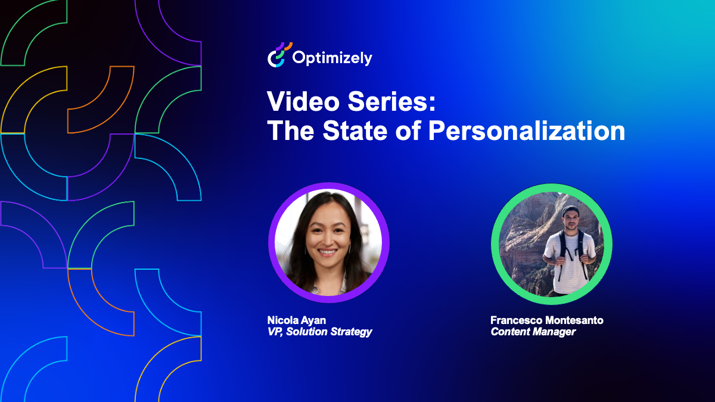Videoserie: Tillståndet för personalisering 2025 och framåt
Nicola Ayan satte sig nyligen ner med Francesco Montesanto för att diskutera allt som rör personalisering. Hör om vart det är på väg och hur Optimizely leder utvecklingen.


Vi vet alla vad personalisering är, eller hur?
Ja, vi förstår kärnkonceptet: din webbplats eller app förändras när användarna interagerar med den för att ge en mer relevant upplevelse.
Det är både så enkelt som det ... och mycket mer komplicerat.
I oktober 2024 rullade Optimizely ut Optimizely Personalization. Det är utformat för att möta behoven hos kunder som snabbt vill skala upp sina program för personalisering. Med Optimizely's bästa personaliseringsmotor i klassen kan kunderna tillhandahålla de 1: 1-upplevelser som deras kunder har kommit att förvänta sig.
Det visar sig att det inte är någon liten bedrift att lansera en strategi för personalisering. Det finns massor av arbete som måste ske bakom kulisserna för att säkerställa att dina kunder inte bara ser rätt innehåll, utan rätt innehåll vid rätt tidpunkt. Från samarbete, till planering, till innehållsskapande, till att sammanföra data, till att leverera upplevelser, till AI, till ... ja ... du fattar poängen.
Jag hade turen att sitta ner med Nicola Ayan, VP, Solution Strategy, för att prata om allt som har med personalisering att göra, hur det ser ut idag och vart det är på väg 2025.
Att komma igång med personalisering
Hur kommer man igång med personalisering när ingen vet var man ska börja? Det var det jag ville veta, och det är det som många marknadsförare vill veta. Vanligtvis vill du börja med antingen dina bäst presterande sidor eller dina mest tillförlitliga datauppsättningar.
Och om du inte är säker på vilka de är, börja med ett problem som du vill lösa; till exempel en flaskhals på din checkout-sida.
Data och personalisering
Behöver företag massor av data eller en robust CDP för att genomföra personalisering?
Visst, mer data leder vanligtvis till bättre resultat, men låt inte en minimal mängd data hindra dig från att lansera din strategi för personalisering. Om du inte arbetar med berg av data, börja med ett eller två segmenteringar eller ett problem och gå vidare därifrån.
Innehåll och personalisering
Behöver företag massor av innehåll för att personalisera?
Precis som med data kan man aldrig få för mycket, men personalisering handlar om att skapa effekt och influencers i kundbeteendet. Hur många delar av innehållet som krävs för att göra det beror på organisationen och målen.
Vilken är den största utmaningen med personalisering?
Det här borde inte komma som en chock för någon, men fragmenterad kunddata är ett stort problem för företag med medelhög till hög mognadsgrad. När du har data lagrad i flera system som webbplatser, datalager, sociala medier och fysiska butiker kan det vara en utmaning att sammanställa allt detta för att skapa en kundprofil.
Trender inom personalisering
Så vart är personaliseringen på väg?
Två koncept som kommer att dominera landskapet för personalisering 2025 och framåt är RAG (retrieval augmented generation), som är en komponent i AI som skapar innehåll baserat på ditt befintliga innehållsbibliotek, med hänsyn till varumärkesriktlinjer och tonalitet, samt styrning.
AI och personalisering
På tal om RAG och AI, hur påverkar AI processen för personalisering?
För det första blir det mycket enklare att skala upp innehåll, särskilt när det gäller att anpassa innehåll till olika branschvertikaler. Istället för att manuellt tilldela dussintals regler för att forma kundupplevelser kan AI dynamiskt tilldela besökare till specifika delar av din webbplats eller din app åt dig, vilket sparar massor av tid.
Trafik och personalisering
Behöver företag massor av trafik till sina webbplatser? Du kanske blir förvånad över att höra att du inte behöver massor av trafik. Till skillnad från experimentering, som förlitar sig på statistisk signifikans, handlar personalisering om att påverka kundbeteende och mäta resultat, vilket inte kräver en förutbestämd mängd trafik.
Data warehouse-native analytics och personalisering
Med Optimizely's förvärv av Netspring, som specialiserar sig på data warehouse-native analytics, hur spelar det in i personalisering?
Ta en titt på Optimizely Campaign
Det är faktiskt ett förvånansvärt enkelt koncept; Mycket data som du behöver för experimentering och personalisering finns helt enkelt inte på en webbplats eller inom lättillgängliga dataplattformar. Ibland behöver du data som är begravd i ett datalager, och det är där magin händer ...
Customer Data Platforms och personalisering
Slutligen talade vi om hur Customer Data Platforms (CDP) är kopplade till personalisering. Detta görs på tre viktiga sätt:
- Harmonisering av data
- Insikter
- Aktivering
För att sammanfatta
Personalisering har funnits i alla tider och på många sätt har det inte förändrats. Det har alltid handlat om att få kunden att känna sig speciell, unik och prioriterad. Det som har förändrats, och som kommer att fortsätta att förändras, är hur snabbt vi kan genomföra det, hur exakta vi kan vara och i vilken grad vi kan påverka kundernas beteende.

